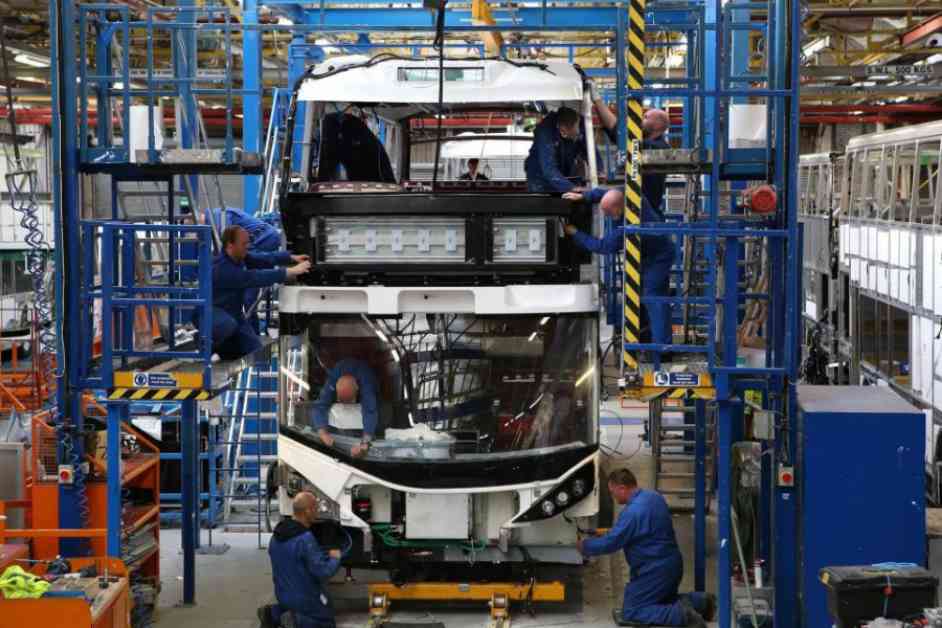Alexander Dennis Faces Job Losses Due to Uneven Playing Field in Bus Manufacturing
In a concerning development for the Falkirk community, bus manufacturer Alexander Dennis has announced that around 160 jobs are at risk at its Falkirk-based factory. The company cited an “uneven playing field” in the industry sector as the primary reason for the potential job losses.
Alexander Dennis, owned by Canadian manufacturing company NFI Group Inc, is a significant employer in the UK, with approximately 1950 employees across the country and 6,350 people in the domestic supply chain. The Larbert-based factory is the group’s largest in the UK, making the potential job losses even more impactful.
According to the company, the government’s zero-emission bus funding has disproportionately benefited competitors with lower labor costs, putting Alexander Dennis at a disadvantage. This imbalance in the industry sector has forced the company to launch a consultation process to address the challenges it is facing.
Challenges Faced by Alexander Dennis
Alexander Dennis highlighted that there are record levels of funding available for zero-emission buses from both the UK and Scottish governments. However, the company expressed concerns that policies in place actively work against British bus manufacturers and put them at a competitive disadvantage.
The company stated that while they adhere to the Fair Work First standards, which are not required of suppliers in other countries, they are limited in their ability to receive funding from the Scottish Government. This discrepancy in policies has created an uneven playing field, making it difficult for Alexander Dennis to compete effectively.
Managing Director Paul Davies expressed disappointment over the situation, attributing the potential job losses to government policies that favor companies operating in lower-security economies. He emphasized the need for a level playing field to strengthen the industry, drive investments in local jobs, and support domestic supply chains.
Unite the Union’s Response
Unite the Union, representing workers at Alexander Dennis, has raised concerns about the impact of the potential job losses on the local community. The union has demanded meetings with both the company and the Scottish Government to address the issues and explore solutions to protect jobs.
Industrial Officer Pat Egan stressed the importance of preserving jobs at Alexander Dennis, highlighting the company’s role as a key player in Scotland’s green manufacturing sector. Egan emphasized the need for ongoing dialogue with stakeholders to safeguard the future of the workforce and support the transition to greener transportation solutions.
The union’s proactive stance underscores the significance of collaborative efforts between industry stakeholders, government bodies, and labor representatives to address systemic challenges and promote sustainable growth in the manufacturing sector.
Looking Towards the Future
As Alexander Dennis navigates the complexities of the bus manufacturing industry, it is essential for all parties involved to work together towards a common goal of fostering a fair and competitive environment. By addressing the underlying issues contributing to the current situation, stakeholders can pave the way for a more resilient and sustainable manufacturing sector.
In the face of economic uncertainties and global challenges, it is crucial to prioritize job retention, skills development, and innovation within the manufacturing industry. By investing in a skilled workforce, promoting ethical business practices, and supporting local manufacturing initiatives, companies like Alexander Dennis can position themselves for long-term success and contribute to the economic vitality of the communities they serve.
The challenges faced by Alexander Dennis serve as a reminder of the importance of systemic reform, collaboration, and forward-thinking strategies in navigating the complexities of the modern manufacturing landscape. By embracing innovation, sustainability, and inclusivity, companies can overcome obstacles, drive positive change, and build a more resilient and prosperous future for all stakeholders involved.
































